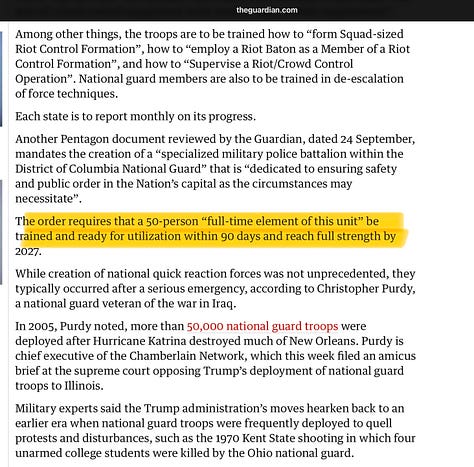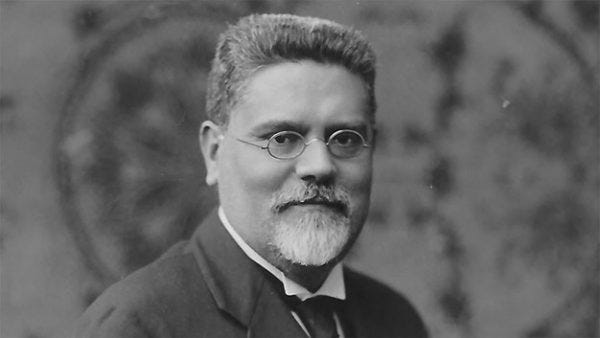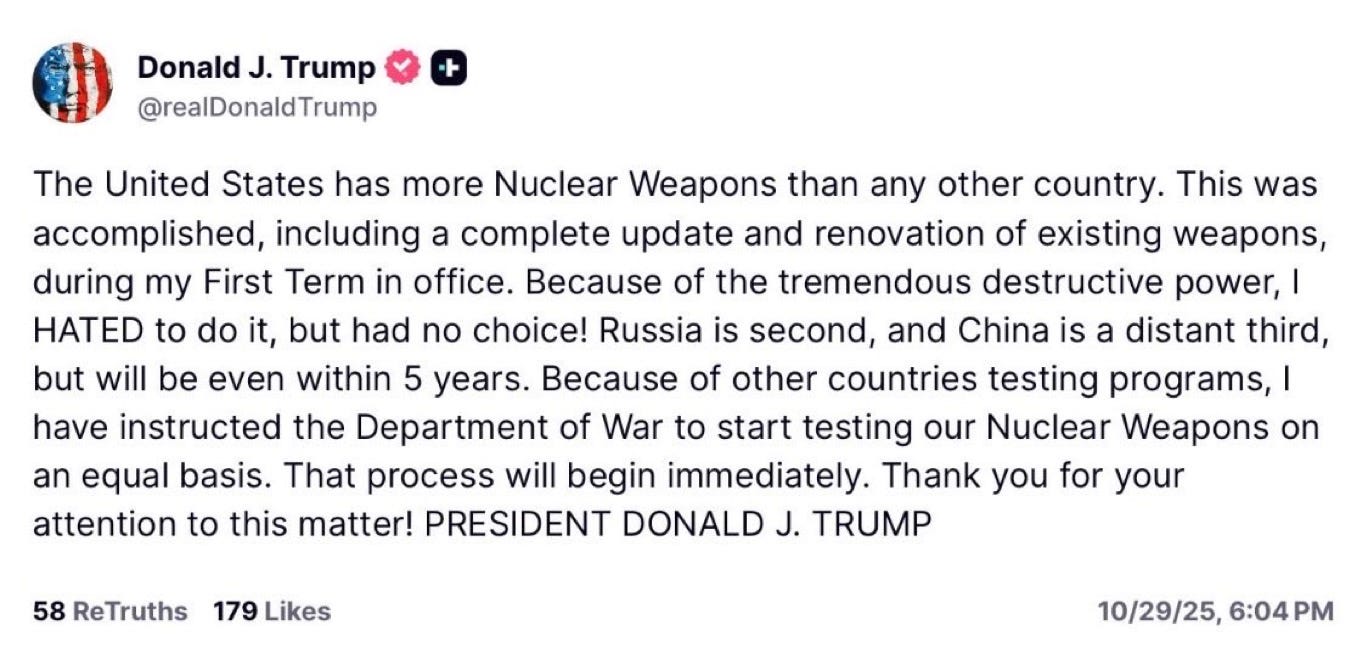Miller and Trump: How the Immoral Weaponizes the Amoral
From Kant to DHS, how ideology without conscience becomes power without morality.
In broad terms, there are three ethical worldviews: moral, amoral, and immoral. Most of us intuitively understand the difference between right and wrong—but when people act outside that boundary, understanding why they do so is both instructive and predictive.
While Abraham Lincoln was a complex man, it’s hard to argue that he wasn’t guided by moral principles: “with malice toward none.”
Stephen Miller on the other hand is deliberately immoral; his desire is to transgress norms and shatter moral boundaries in order to effectuate his racist fantasy. Miller is driven by ideology.
Donald Trump is different—his actions are immoral, but morality has no bearing on his personal alternate reality. Trump has no ideology—his worldview centers entirely on expanding and protecting his own ego. He is, in essence, amoral.
As I wrote, Donald Trump’s alternate reality is shaped by Stephen Miller and the loyalists he installed around him. His sycophants manufacture “evidence” that supports their own immoral ideology and Trump’s amoral desire to gain more money and power.
Simply put, Stephen Miller knows what he’s doing is wrong, while Trump has no concept of right or wrong. Trump just doesn’t care as long as he thinks it helps him—or hurts his personal enemies. We’re witnessing immorality weaponizing amorality.
This dyad of immoral and amoral personalities has been seen before, and it deserves to be understood in historical, political, and philosophical context.
You Kant Always Get What You Want
“Enlightenment is man’s emergence from his self-incurred immaturity.
Immaturity is the inability to use one’s understanding without the guidance of another.
Dare to know!
Have the courage to use your own understanding.”
—Immanuel Kant, “An Answer to the Question: What is Enlightenment?” (1784)
Immanuel Kant (1724-1804) was a Prussian philosopher who crystallized the Enlightenment’s goal of using reason as the source of morality. Kant’s test for morality is the categorical imperative—the universal moral law that provides no exceptions for personal desire. His most famous formulation:
“Act only according to that maxim whereby you can at the same time will that it should become a universal law.”
—Immanuel Kant, Groundwork for the Metaphysics of Morals (1785)
This is a reason-based version of the Golden Rule. It requires no personal empathy—e.g. “do unto others”—it instead relies on a rational calculation of whether an act should become a rule for all. If it would collapse trust, truth, or freedom, that act is immoral, according to Kant.
What the Hegel?
Georg Wilhelm Friedrich Hegel (1770-1831) was a German philosopher who overlapped with the Enlightenment and Romantic periods and provided a body of work that was used—and abused—by numerous schools of thought.
His work largely focused on what he called the Geist—Spirit—which is not a being but a process, an unfolding of reason as a dialectic, of thesis and antithesis coming into conflict. From this conflict arises a synthesis to resolve them. But Hegel deliberately collapsed the theological Spirit with the rational dialectical process of conflict resolution and wielding power. He saw these as the same thing, essentially an argument for a kind of rational pantheism.
“Spirit is only what it is through its own activity; it is the movement of becoming what it is.”
—Georg Hegel, Phenomenology of Spirit (1807)
But in his later work, Hegel’s formalization included the state as a vehicle for the Spirit.
“The state is the actuality of the ethical Idea. It is ethical mind qua the substantial will manifest and revealed to itself, knowing and thinking itself, accomplishing what it knows; and, in so far as it knows it.”
“…this final end has supreme right against the individual, whose supreme duty is to be a member of the state.”
—Georg Hegel, Philosophy of Right (1821)
Here the abstract becomes concrete: the rational Spirit becomes the politics of the State.
Hegel’s model of dialectics was adopted by many, including Karl Marx and his communist contemporaries. But Marx inverted them to form his materialist ideology.
“My dialectic method is not only different from the Hegelian, but is its direct opposite. With Hegel, the life-process of the human brain, i.e. the process of thinking, under the name of ‘the Idea,’ is the demiurgos of the real world… With me, on the contrary, the ideal is nothing else than the material world reflected by the human mind, and translated into forms of thought.”
—Karl Marx, Capital, Vol. 1, Postface to the 2nd German ed. (1873)
Friedrich Nietzsche (1844-1900), on the other hand, rejected Hegel’s dialectics altogether, and his formulation of Spirit and State as the engine and vehicle of morality:
“The last phenomenon should have made them suspicious: … the subordination of all educational aspirations to state purposes … the tendency of Hegelian philosophy.“
—Friedrich Nietzsche, “On the Future of Our Educational Institutions” (1872)
Nietzsche saw the will to power as the only true form of morality and the Übermensch as the idealized version of man’s striving for self-actualization.
These ideas, all created in a quest to understand and shape the moral character of the world, gave rise to the two most destructive ideologies of the 20th and 21st centuries—communism and fascism.
Mussolini’s Muse
Giovanni Gentile (1875–1944) was an Italian philosopher and politician who helped create Italian idealism, based in Hegelian dialectics. He also considered himself the “philosopher of Fascism.”
In 1925, Gentile wrote “Manifesto of the Fascist Intellectuals” which formally established the ideology and politics of Italian Fascism, a street movement started by Benito Mussolini in 1915, which transformed into the National Fascist Party in 1921—“a revolutionary militia placed at the service of the nation. It follows a policy based on three principles: order, discipline, hierarchy.”
In 1929, Gentile wrote:
“It is man himself, so far as he realises himself universally, determining this universality in a certain form… [… N]one of the material or moral elements that belong to the life of a people is extraneous to this wholly spiritual form that is sealed in the self-conscious [bond of] nationhood that is state.”
It was Gentile’s synthesis of Hegelian philosophy that gave Mussolini’s movement its shape, and propelled Italy into a corporatist, fascist dictatorship that ultimately submitted to its offspring, National Socialism. Gentile’s perversion of morality—his intellectualized immorality—complemented Mussolini’s amorality. Gentile was murdered by Italian anti-fascists in 1944.
To summarize in very broad strokes:
Kant: Reason creates morality.
Nietzsche: The will to power is the only morality.
Hegel: The State, as an expression of Spirit, dictates morality.
Gentile, along with Carl Schmitt, Nazism’s chief philosopher, used these ideas to create the intellectual ballast that kept Mussolini and Hitler’s movements together long enough to generate the deadliest conflict in world history.
Ideological immorality gives permission to personal amorality to operate on its behalf—but a century of experience with this dyad has not prevented history from repeating in American form.
Miller’s Immorality
I’ve written extensively on Stephen Miller‘s ideology of hate, and while his personal deviance is clear, so is his knowledge of history and political theory. Unlike Trump, Miller is not unintelligent. Miller knows right and wrong, and not only chooses wrong, but actively sought out and secured a more powerful vehicle for expressing his malign intent. Like Gentile with Mussolini, and Schmitt with Hitler, Stephen Miller is profoundly immoral—and chose an amoral amplifier, Donald Trump.
As one small example of the immorality of this regime, and the amorality of its apparatchiks, this is the kind of scene that happens with increasing frequency and ferocity in Chicago and surrounding suburbs. A mother is fired on with pepper balls by federal agents as she screams that she has kids in the car. [h/t Pablo Manriquez]
The interpretation of this video, which I experienced first hand after a viral post about it, is emblematic of the moral character—and lack thereof—of a significant portion of the population. When someone says “I voted for this” about a scene of terrorism and trauma, they are admitting that their basic decency has been completely eroded; they have lost contact with collective morality.
The governor of Illinois, JB Pritzker, implored DHS to put this kind of assault on the population on pause through the Halloween weekend, so kids can avoid being tear-gassed while they Trick-or-Treat.
In response to a question from the press about Pritzker’s request, nominal DHS head Kristi Noem shows the kind of mindless amorality that Hannah Arendt called the “banality of evil.”
“No, we’re absolutely not willing to put on pause any work that we will do to keep communities safe. The fact that Governor Pritzker is asking for that is shameful. And I think unfortunate that he doesn’t recognize how important the work is that we do… especially when we’re going to send all of our kiddos out… enjoying the holiday season. We want to make sure that they’re safe.”
By contrast, here is Stephen Miller’s wife Katie, showing her conscious immorality. On a deliberately provocative panel by Piers Morgan, alt-left podcaster Cenk Uygur tries to push back on her husband’s policies. Her response:
“You better check your citizenship application and hope everything was legal and correct. Because you be just like Ilhan Omar coming in next.”
Katie Miller’s threat to weaponize her husband’s power to check the papers of a naturalized U.S. citizen to threaten his deportation is an example of aggressive immorality in the wild. She not only knows what she’s saying is wrong—she’s basking in her power to do it with no consequences.
The same institutionalized immorality is seen in the propaganda of the DHS. Here are three recent examples of transgressive memes posted in its recruitment efforts.



The first reframes the American Revolution as an anti-immigrant movement. The second inverts Tolkien, making Frodo the villain. The third is the most insidious, because it targets gamers and has a very ugly undertone. In Halo—full disclosure: I’ve worked on three Halo games—“the Flood” is a parasitic alien life form that presents an existential threat. “Destroy the Flood” is equivalent to calling for a genocide of parasites.
As a final example of the aggressive immorality of DHS and its satellite agencies, it put out this video depicting Border Patrol commander Greg Bovino as a near-perfect replica of a Nazi officer. It uses a sped up version of Coldplay’s song “Viva la Vida” to depict a militarized attack on U.S. cities.
WE WILL NOT BE STOPPED is not a message consistent with law enforcement; it’s the message projected by an attacking, conquering army.
Miller’s immorality has been mirrored and amplified across the federal government. But Miller could never lead on his own; that’s why he needed the amorality of Donald Trump.
Deadly Dyad
When the immoral and amoral collude to seize and abuse power, you have both the animating ideology and the void of conscience necessary to do evil, the deadly dyad—Gentile and Mussolini; Schmitt and Hitler; and Miller and Trump.
The militarization of America in advance of the midterms, including the formation of a “quick reaction force” in all fifty states, is the same playbook employed by the previous incarnations of this dangerous collaboration.



Similarly, the foreign policy of nations that have been stricken with this formulation of immorality and amorality tend to be both protectionist and imperial. America has now sent 15% of its total naval power to the region near Venezuela—after murdering over fifty people in extrajudicial bombings of small boats in the Caribbean and Eastern Pacific. Simultaneously, Trump is withdrawing troops from the European theater.


Finally, it’s difficult to overstate the existential danger of this combination when given power over others. Neither Mussolini nor Hitler had nuclear weapons.
Trump’s demand that the U.S. begin to test nuclear weapons for the first time since 1992, just in advance of his meeting with Xi, is amorality writ very large. This is his ego wanting to show dominance—while in reality Xi cleaned his clock.
Little boy plays with matches in a House of Dynamite.
“We are not living in ordinary times, and we will not get out of them by ordinary means.”
— Albert Camus, Letters to a German Friend (1944)
If you are able to help me continue my work, please consider upgrading to a paid subscription. It really means a lot. Thank you!
Here are a few benefits to upgrading:
Live Zoom call each Sunday
Ability to comment and access all content
Wonderful, supportive community
Helping independent journalism fill in the gaps for our failing media
Thank you for reading and sharing my work. Grateful for your support.
If you’d like to help with my legal fees: DefendSpeechNow.org.
My podcast is @radicalizedpod & YouTube — Livestream is Fridays at 1PM PT.
Bluesky 🦋: jim-stewartson
Threads: jimstewartson








This is some Scary Stuff ‼️😱 Thank you, here's hoping you and your readers have a Happy Halloween 👻 and will reStack ASAP 💯 👍🎃🦇
An excellent psychological explanation of a PRESIDENT who posts videos of himself dumping feces on the American people.
To fully understand Trump you MUST also factor in the psychopathology of the Bloodlines, the Luciferians/Jezuits and the Secret Societies. They have a mind culture that the masses can't even begin to imagine.